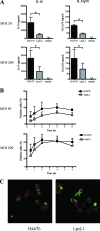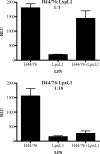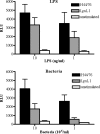Differential activation of human and mouse Toll-like receptor 4 by the adjuvant candidate LpxL1 of Neisseria meningitidis
- PMID: 18490457
- PMCID: PMC2493235
- DOI: 10.1128/IAI.00005-08
Differential activation of human and mouse Toll-like receptor 4 by the adjuvant candidate LpxL1 of Neisseria meningitidis
Abstract
Neisseria meningitidis LpxL1 lipopolysaccharide (LPS) bearing penta-acylated lipid A is considered a promising adjuvant candidate for inclusion in future N. meningitidis vaccines, as it elicits a markedly reduced endotoxic response in human macrophages relative to that in wild-type (hexa-acylated) LPS, while it is an equally effective adjuvant in mice. As dendritic cells (DC) and Toll-like receptors (TLR) are regarded as central mediators in the initiation of an immune response, here we evaluated the ability of LpxL1 LPS to mature and to activate human DC and examined its TLR4-/MD-2-activating properties. Unexpectedly, purified LpxL1 LPS displayed minimal human DC-stimulating properties compared to wild-type LPS. Although whole bacteria induced DC maturation and activation irrespective of their type of LPS, the LpxL1 mutant failed to activate the human recombinant TLR4/MD-2 complex expressed in HeLa cells. Similarly, purified LpxL1 LPS was unable to activate human TLR4/MD-2 and it even acted as an antagonist of wild-type LPS. Both wild-type and LpxL1 LPSs activated the murine TLR4/MD-2 complex, consistent with their abilities to induce maturation and activation of murine DC. Assays with cells transfected with different combinations of human and murine TLR4 and MD-2 indicated that TLR4 was a more-major determinant of the LPS response than MD-2. The species-specific activation of the TLR4/MD-2 complex by LpxL1 LPS may have an impact on the use of LpxL1 LPS as an adjuvant and the use of murine immunization models in human meningococcal vaccine development.
Figures






References
-
- Akashi, S., Y. Nagai, H. Ogata, M. Oikawa, K. Fukase, S. Kusumoto, K. Kawasaki, M. Nishijima, S. Hayashi, M. Kimoto, and K. Miyake. 2001. Human MD-2 confers on mouse Toll-like receptor 4 species-specific lipopolysaccharide recognition. Int. Immunol. 131595-1599. - PubMed
-
- Banchereau, J., and R. M. Steinman. 1998. Dendritic cells and the control of immunity. Nature 392245-252. - PubMed
-
- Cartwright, K., R. Morris, H. Rumke, A. Fox, R. Borrow, N. Begg, P. Richmond, and J. Poolman. 1999. Immunogenicity and reactogenicity in UK infants of a novel meningococcal vesicle vaccine containing multiple class 1 (PorA) outer membrane proteins. Vaccine 172612-2619. - PubMed
-
- de Kleijn, E. D., R. de Groot, J. Labadie, A. B. Lafeber, G. van den Dobbelsteen, L. van Alphen, H. van Dijken, B. Kuipers, G. W. van Omme, M. Wala, R. Juttmann, and H. C. Rumke. 2000. Immunogenicity and safety of a hexavalent meningococcal outer membrane vesicle vaccine in children of 2-3 and 7-8 years of age. Vaccine 181456-1466. - PubMed
-
- Dixon, G. L., P. J. Newton, B. M. Chain, D. Katz, S. R. Andersen, S. Wong, P. van der Ley, N. Klein, and R. E. Callard. 2001. Dendritic cell activation and cytokine production induced by group B Neisseria meningitidis: interleukin-12 production depends on lipopolysaccharide expression in intact bacteria. Infect. Immun. 694351-4357. - PMC - PubMed
Publication types
MeSH terms
Substances
Grants and funding
LinkOut - more resources
Full Text Sources
Other Literature Sources
Molecular Biology Databases
Research Materials

